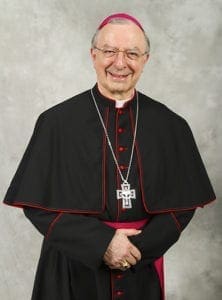Enlightening numbers on young Catholics
By BISHOP JOEL M. KONZEN, SM | Published May 26, 2022 | En Español
In a major research study released in 2021 (Springtide Research Institute), young Catholics between the ages of 13 and 25 were asked numerous questions about their spirituality, faith and beliefs. The study is important because it’s the largest such study we have to tell us how young Catholics are thinking and relating to their church. The study also compared young Catholics’ responses to those in the general population. I can present only some highlights here, but they are enlightening.

Bishop Joel M. Konzen, S.M.
50% of Catholics between 13 and 25 believe without doubt in a higher power or believe it more than they doubt it. This is slightly above (by 3%) the general population. The other 50% are in some stage of doubt or disbelief about that higher power. This same 3% difference is apparent when Catholic young people say spending time with family brings fulfillment to their lives (58% vs. 55%). 35% of Catholics in this age group agreed with “I did not do anything with religion as a child”—a rather startling number. 42% of all respondents (Catholics and others) between 13 and 25 agreed with that statement.
50% of young Catholics say they don’t know how to get connected to a faith community even if they’d like to. I have to believe that this is coming especially from those on the older end of the 13-25 age spread. 42% of these younger Catholics say that they don’t turn to faith communities due to a lack of trust in the people, beliefs and systems of organized religion. They often give examples of churches or persons who made them wary or turned them off by the versions of Christianity that were being preached or espoused. 38% of younger Catholics said that they have been harmed by religion, although it’s hard to know from the study what is behind that statement.
Differences by family origin are significant. In responding to “I am a member of a spiritual or religious community,” 78% of Asian American young people responded affirmatively. For Black or African American Catholics, it was 71%. For white young people, 48%, and for Hispanic or Latino young Catholics, 47%. Only 31% of young Catholics in all ethnicities and origins agreed that they “try hard to carry my religious beliefs into all my other dealings in life.”
It may not be surprising that young people (Catholics and others) who describe themselves as “flourishing a lot” are likely to be those who identify as “very religious” and “religious”—often by a ratio of around 60-65% of all those surveyed, giving some support to the role that religious involvement plays in overall well-being.
What are we to make of these findings as we look to work with Catholic teens and young adult Catholics? First, we must acknowledge that these are two different groups, at widely varying stages of their human and faith development, not easily combined into a single category. It is likely that the more skeptical responses pertain to the upper end of the 13-25 age spread. Clearly, both teens and young adults are not as likely as their parents to see themselves belonging to or worshiping as part of a church. In a separate study by Pew Research in 2019, only 45% of teens whose parents said that religion is very important in their lives made that same claim for themselves.
Many parishes are devoting attention and resources to ministry with Catholic young adults. The Archdiocese of Atlanta is strengthening its outreach to Catholic college students on a number of campuses. These efforts, along with ambitious youth programs for teens in our parishes, are needed and worthwhile, for the well-being of young Catholics and for the future of the Catholic Church. And, while religiously active parents do not always see their children follow through with the same intensity, parents in the Pew Survey who said that religion was not very important to them saw that same sentiment mirrored almost exactly by their teens.